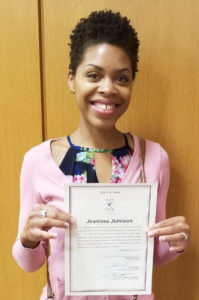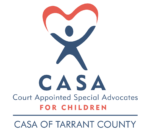Disclaimer :: CASA of Tarrant County sponsored and crafted this post to share information about its work with children in our community.
When most people are confronted with a news story about a child who has suffered abuse or neglect, they either hurry past the unpleasant headline or simply shake their heads in despair, thinking what a sad story before moving on.
But that wasn’t the case with Jeanisea. She decided she wanted to take action.
This Fort Worth mom is one of more than 400 Tarrant County community members who are part of CASA of Tarrant County, a non-profit organization that trains volunteers to serve as advocates for children in foster care.
That’s a lot of caring community members, but it’s not enough. Each year, about 300 abused and neglected kids in Tarrant County are left waiting for an advocate.
 While many people get involved after a child is placed into foster care — such as CPS caseworkers, lawyers, judges, and family members — advocates (also called “CASAs”) are the only players in a child abuse case who are there as volunteers representing the best interests of the child, as well as the eyes and ears of the community.
While many people get involved after a child is placed into foster care — such as CPS caseworkers, lawyers, judges, and family members — advocates (also called “CASAs”) are the only players in a child abuse case who are there as volunteers representing the best interests of the child, as well as the eyes and ears of the community.
The ultimate goal of a CASA’s work is to advocate for a safe and permanent living situation for the child. In some cases, that might mean reunification with parents. In others, it might mean adoption, placement with a family member or family friend, or long-term foster care.
To get a better understanding of CASA’s impact in our community and the role that advocates play in the child welfare system, we sat down with Jeanisea to find out more.
 Jeanisea, what inspired you to become a CASA?
Jeanisea, what inspired you to become a CASA?
I kept hearing and seeing commercials for CASA, and that got me wondering about who CASA is and what they do. Once I learned more, I really identified with the need, especially as a mom. It just seemed like a no-brainer. I had the time, I had the passion, so it was an easy decision.
Do you need any special skills or training to be an advocate?
You have to complete 33 hours of training before you’re sworn in. Beyond that, you don’t need special skills, just a heart to help kids.
What about the time commitment?
Being a CASA does take time — at least a few hours a month, or more if you have a particularly challenging case. But it’s very manageable. You can do a lot of the work when it’s convenient for you, and you usually have quite a bit of advance notice for court hearings.
Can you give us a few examples of what you do as a CASA?
One of the main activities (and also one of my favorites) is visiting or talking to the kids in my case.
Other activities include going to court, completing documentation in the CASA system, and research. For example, I often research articles and videos about child behavior issues and forward them to the placement provider (the family member who is taking care of the children in a child welfare case).
By the way, you don’t have to manage all of this on your own. Each CASA is assigned a staff person (known as a child advocacy specialist) who is there to support you and provide guidance.
 What are some of the challenges encountered as a CASA?
What are some of the challenges encountered as a CASA?
It’s hard to guess how a case is going to make you feel until you get into it. Sometimes I get frustrated about situations in my current case, but I’ve learned to keep those responses in check. You have to present information in an objective, calm manner in order to get the best results for the children you represent. Emotions and personal opinions won’t get your point across; facts and persistence will. This can be challenging, but I’ve appreciated the opportunity to build that skill.
What else do you find rewarding about being a CASA?
The main reward is the kids themselves. When the kids on my current case came into care, they were in rough shape due to neglect. Now I see them running around with pudgy cheeks, laughing and smiling. They don’t have temper tantrums anymore but are instead learning to use their words. It’s very gratifying to see that kind of progress.
 What advice do you have for new CASAs or anyone thinking about becoming a CASA?
What advice do you have for new CASAs or anyone thinking about becoming a CASA?
For new CASAs: Don’t be afraid to ask questions. Call, email, text, whatever you need to do.
For someone who is thinking about being a CASA: The CASA slogan, “speak up for a child,” is about as real as it can get. If you have a passion for children, being a CASA is rewarding and fruitful. Once you get into it, you won’t think about the time you’re giving up. In fact, you’ll be surprised at the time you will find for helping your kids — and you’ll be surprised at the joy it will give you.
April is Child Abuse Prevention Month. Last year alone, more than 5,800 Tarrant County children were identified as confirmed victims of child abuse and neglect. You can help. To sign up for an upcoming CASA Volunteer Information Session or discover other ways to get involved, visit speakupforachild.org today.
 CASA of Tarrant County and its court-appointed volunteers advocate for the best interest of abused and neglected children. CASA recruits, trains, and supervises community members to become volunteer advocates for children during their time in foster care. The impact of a CASA is so strong that children without a CASA are twice as likely to re-enter foster care compared children who had a CASA volunteer.
CASA of Tarrant County and its court-appointed volunteers advocate for the best interest of abused and neglected children. CASA recruits, trains, and supervises community members to become volunteer advocates for children during their time in foster care. The impact of a CASA is so strong that children without a CASA are twice as likely to re-enter foster care compared children who had a CASA volunteer.
Giving a child the gift of a CASA volunteer significantly improves a child’s future: his or her health, family, and involvement in our community. Every foster child deserves the chance for a better life. You can make sure abuse and neglect does not get the last word when you give a child a CASA advocate and can help the child to heal and discover a future that is brighter than the past.













